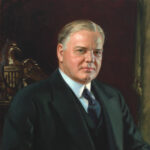
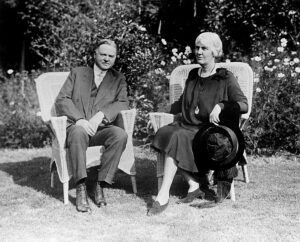 For nearly a month beginning June 17, 1900, the man who would become President Herbert Hoover and his wife, Lou were caught up in what was to become known as the Boxer Rebellion in China. During the Boxer Rebellion, the community of foreigners the Hoovers lived in, in the city of Tianjin, was besieged and under attack. You might wonder how a future president could be caught up in such a situation, but remember, he wasn’t president yet. He was a citizen. After they were married in Monterey, California, on February 10, 1899, Herbert and Lou Hoover left on a honeymoon cruise to China. Following their honeymoon, Hoover started his new job as a mining consultant to the Chinese emperor with the consulting group Bewick, Moreing and Company.
For nearly a month beginning June 17, 1900, the man who would become President Herbert Hoover and his wife, Lou were caught up in what was to become known as the Boxer Rebellion in China. During the Boxer Rebellion, the community of foreigners the Hoovers lived in, in the city of Tianjin, was besieged and under attack. You might wonder how a future president could be caught up in such a situation, but remember, he wasn’t president yet. He was a citizen. After they were married in Monterey, California, on February 10, 1899, Herbert and Lou Hoover left on a honeymoon cruise to China. Following their honeymoon, Hoover started his new job as a mining consultant to the Chinese emperor with the consulting group Bewick, Moreing and Company.
In 1900, a Chinese secret organization called the Society of the Righteous and Harmonious Fists led an uprising in northern China against the spread of Western and Japanese influence there. The uprising would become known as the Boxer Rebellion of 1900. The rebels performed calisthenics rituals and martial arts that they believed would give them the ability to withstand bullets and other forms of attack. Westerners referred to these rituals as shadow boxing, leading to the Boxers nickname. They also killed foreigners and Chinese Christians, and they destroyed foreign property.
The Boxers besieged the foreign district of China’s capital city Beijing, which was called Peking then, from June to August. It was at that point that an international force that included American troops ended the uprising. By the terms of the Boxer Protocol, which officially ended the rebellion in 1901, China agreed to pay more than $330 million in reparations. In the end, America returned the money it received from China after the Boxer Rebellion, on the condition it be used to fund the creation of a university in Beijing. Other nations involved later remitted their shares of the Boxer indemnity too.
Western nations and Japan had forced China’s ruling Qing dynasty to accept wide foreign control over the country’s economic affairs by the end of the 19th century. China had resisted the efforts throughout the Opium 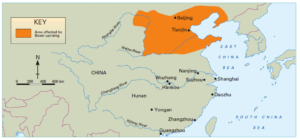 Wars of 1839-1842 and 1856-1860, by means of popular rebellions and the Sino-Japanese War, but without a modernized military, China had suffered millions of casualties.
Wars of 1839-1842 and 1856-1860, by means of popular rebellions and the Sino-Japanese War, but without a modernized military, China had suffered millions of casualties.
John Hay, the US Secretary of State from 1898 to 1905, began to implement an “Open Door Policy” to push for American and European influence over the Chinese trade and economic partnerships. The Open Door Policy called for a system of equal trade and investment and to guarantee the territorial integrity of Qing China. The policy was met with indifference or resistance by other key players, including the Qing Empress Dowager Tzu’u Hzi, but it brought continued Western influence over domestic Chinese affairs, and it set the stage for the rebellion.
The Boxers came from various parts of society, but many were peasants, particularly from Shandong province, which had been struck by natural disasters such as famine and flooding. These things made them particularly volatile. In the 1890s, China had given territorial and commercial concessions in this area to several European nations, and the Boxers blamed their poor standard of living on foreigners who were colonizing their country.
The siege stretched into weeks, and the diplomats (including the Hoovers), their families, and guards suffered through hunger and degrading conditions as they fought to keep the Boxers at bay, while the Western powers and Japan organized a multinational force to crush the rebellion. It is thought that several hundred foreigners and several thousand Chinese Christians were killed during this time. On August 14, after fighting its way through northern China, the rescue began, when an international force of approximately 20,000 troops from eight nations, including Austria-Hungary, France, Germany, Italy, Japan, Russia, the United Kingdom and the United States arrived to take Beijing. The Boxer Rebellion formally ended with the signing of the Boxer Protocol on September 7, 1901. “By terms of the agreement, forts protecting Beijing were to be destroyed, Boxer and Chinese government officials involved in the uprising were to be punished, foreign legations were permitted to 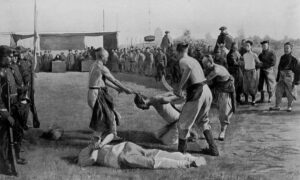
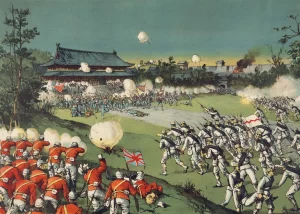 station troops in Beijing for their defense, China was prohibited from importing arms for two years and it agreed to pay more than $330 million in reparations to the foreign nations involved.” The Qing dynasty, which was established in 1644, was weakened by the Boxer Rebellion. Following an uprising in 1911, the dynasty came to an end and China became a republic in 1912.
station troops in Beijing for their defense, China was prohibited from importing arms for two years and it agreed to pay more than $330 million in reparations to the foreign nations involved.” The Qing dynasty, which was established in 1644, was weakened by the Boxer Rebellion. Following an uprising in 1911, the dynasty came to an end and China became a republic in 1912.


Leave a Reply